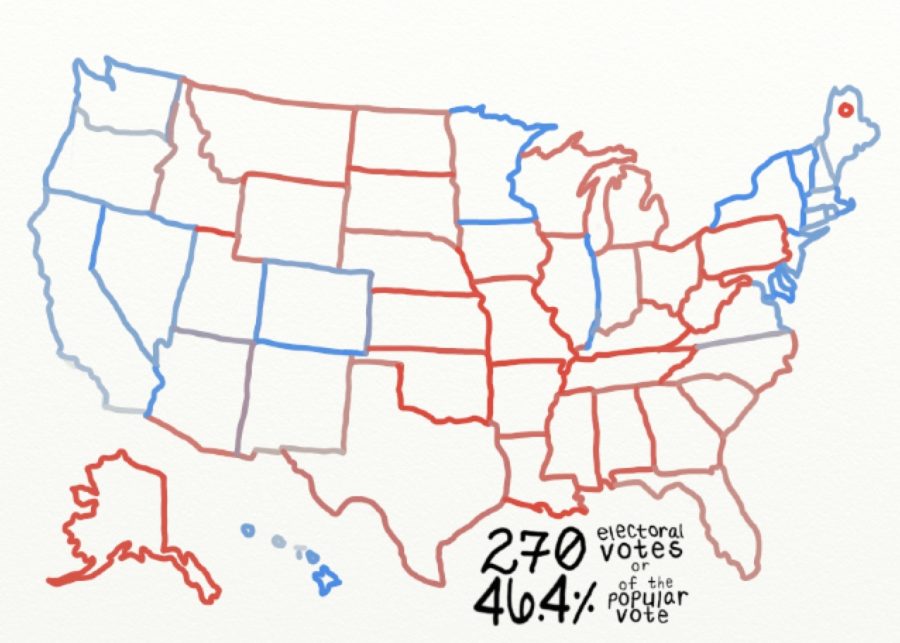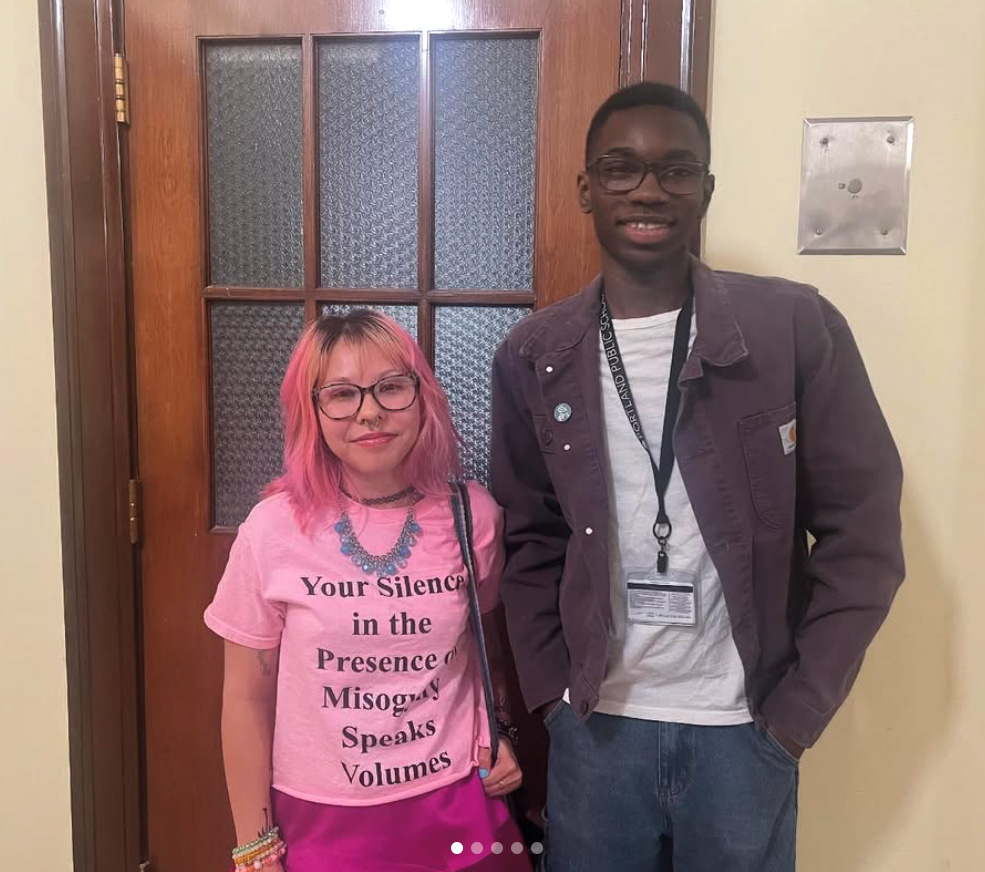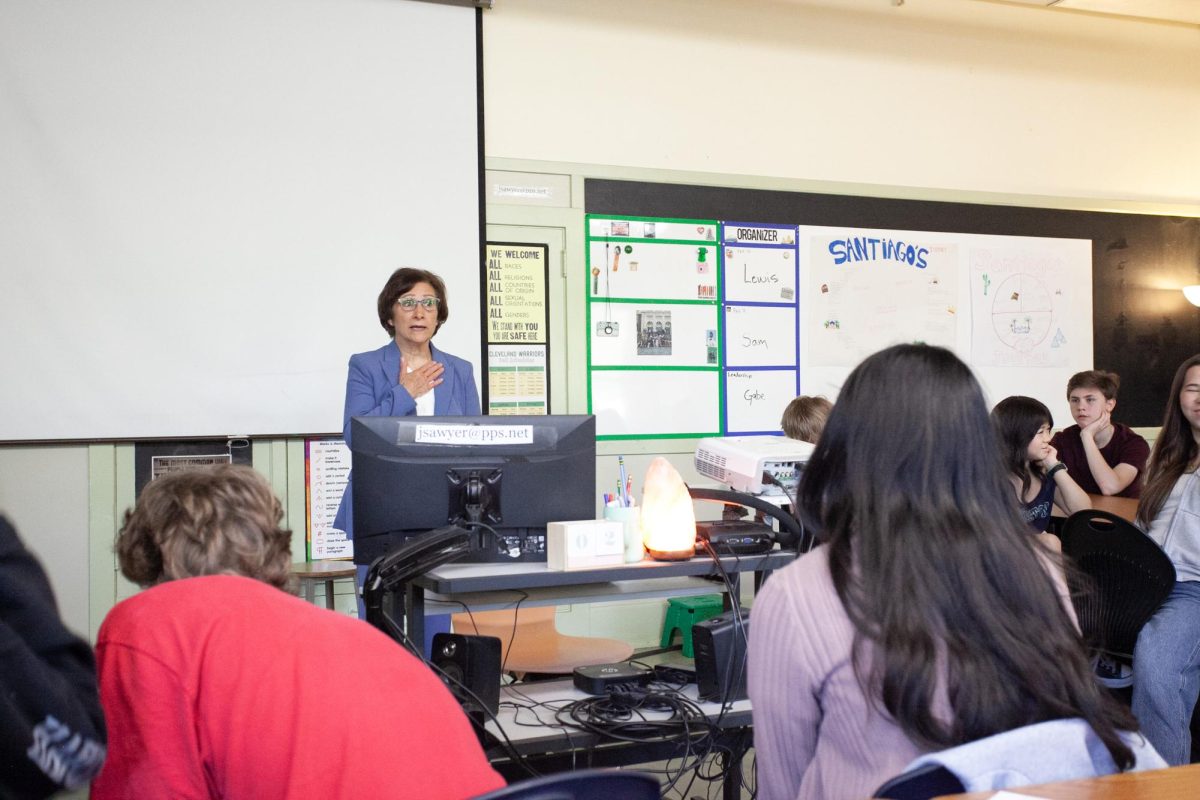Flaws in the Electoral College
Clarion photo Brooklyn Pierce
How to win the presidential election in 2016.
March 8, 2017
The results of November’s presidential election exemplify the problem many have with the Electoral College.
In this “winner-take-all” system, the president could theoretically win with only 21.8 percent of the popular vote. As California Senator Barbara Boxer wrote, “The presidency is the only office where you can get more votes and still lose.” Trump won with almost three million less than majority of the national popular vote. This catastrophe demonstrates that the Electoral College does not adequately represent a voter, leading to a dichotomy of beliefs between the people and the government. As the United States is formally a republic and not a democracy, we should follow the philosophy that this country is based upon. That being, in a republic, each citizen receives equal and complete representation as rule of law, an ethical formality overshadowed by the voting procedure.
When I see the aftereffects of this election, I find that the Electoral College is fundamentally wrong; the concept itself is practically archaic and it lessens the power of the people. CNN affirmed the consequences of the discrepancy saying, “53 percent disapprove of the way the President is handling his job.” This makes Trump the first U.S. president with a negative net-rating this early in his tenure. The voice of voters have been unjustly diluted by the Electoral College, illustrating our need for a change. The subsequent effects of the election occur due to a cluster of reasons dating back to the Constitutional Convention in 1787.
The manner of how the president should be elected puzzled those framing the Constitution, causing them to send the issue to the “Committee on Postponed Matters.” To resolve this hurdle, they combined proportional representation and popular vote to create a “College of Electors,” described in Article II, Section 1 of the Constitution. Although the Framers unanimously passed the provision, it quickly underwent many changes, such as Amendment 12. Albeit, the Electoral College was a product of its time and never worked quite as envisioned.
The body was created for four main reasons: First, the 13 states feared anything instituted by a strong national government, meaning the election process, needed to favor the states. Secondly, the U.S. at the time contained only four million people. Since transportation was practically nonexistent throughout the states, a national campaign was almost impossible. Even if somebody wanted to campaign, many founders strongly discouraged it. The influence of British philosophers, such as Henry St. John Bolingbroke, led most to think that political parties were fundamentally evil. As said by Silas Wright, in the 1700s, “The office should seek the man, the man should not seek the office.”
Today, those reasons hold no significance other than understanding their decision. In fact, there are barely any modern defenses for the Electoral College. The only positive impact is that candidates prioritize minorities in many battleground states. Hillary Clinton spent $22 million on advertisements targeting the Cuban population in an effort to gain Florida’s 29 Electoral College votes. Undoubtedly, this is a beneficial outcome, however, regardless of the presence of the Electoral College, the voices of minorities should be recognized. Conversely, this causes candidates to neglect campaigning to “safe states” where a party has historically maintained popularity (i.e. New York usually supports the Democrat, and Georgia the Republican). When only 55 percent of voters casted ballots, a 20 year low, campaigns should advocate for higher turnouts in general.
With that in mind, apportionment of electors is still greatly skewed. While this certainly favors small states, it actually devalues votes from more populous states. To illustrate my point, the vote of a Wyoming citizen weighs nearly four times as much as an individual in Texas. As of 2014, Wyoming has a population of 584,153 people, and the population of Texas is 26.96 million. The state of Wyoming has three electoral votes, and Texas has 32 votes. If you divide the state population by how many votes they were allocated, then you can see that for every one elector there are 194,717 votes. Whereas, in Texas, they have 842,500 votes per single elector. Why should the significance of an individual’s vote become dependent on which state they live in?
Additionally, many voters feel disenfranchised by the Electoral College through inconsistencies such as this year’s and the 2000 election. Furthermore, the electors are not required to vote in alignment with their state. Although rare, this causes distrust among voters, particularly in the remaining 16 states which don’t hold state conventions to chose their electors. This means there is no connection between the state citizens and the elector who votes on their behalf. In spite of that, these “faithless electors” could be the key to ending the Electoral College.
To resolve this issue, the National Popular Vote Interstate Compact (NPVIC) suggests that state electors give their votes to whichever candidate receives the overall popular vote. This process is much quicker to incite rather than actually amending the Constitution. Currently, ten states and the District of Columbia have agreed to the compact, providing 165 electoral college votes. When the compact receives 105 more votes, it will go into effect, as this meets the 270 majority guaranteeing the win.
Locally, the Oregon House of Representatives passed the National Popular Vote proposal (HB2731) three times. Even so, the bill died each time in Senate without a hearing. This hearing had the potential to change the voting system in the U.S. With five examples to look towards as reminders (the elections of 1824, 1876, 1888, 2000, and 2016), it’s crucial to understand the faults of the Electoral College. A change from this outmoded and nonrepresentative system is long overdue. As a future voter and current constituent, I want to ensure my vote isn’t weakened due to the Electoral College. Through state solutions like NPVIC, we can easily begin to amend the voting process in the United States.











